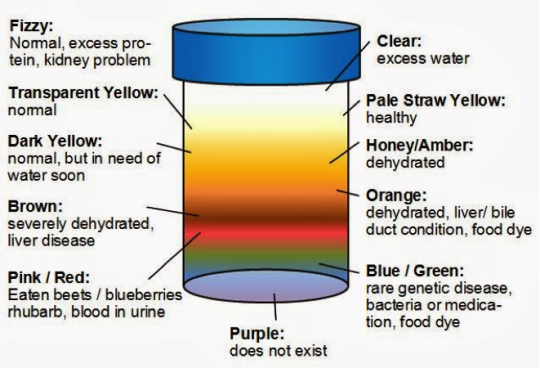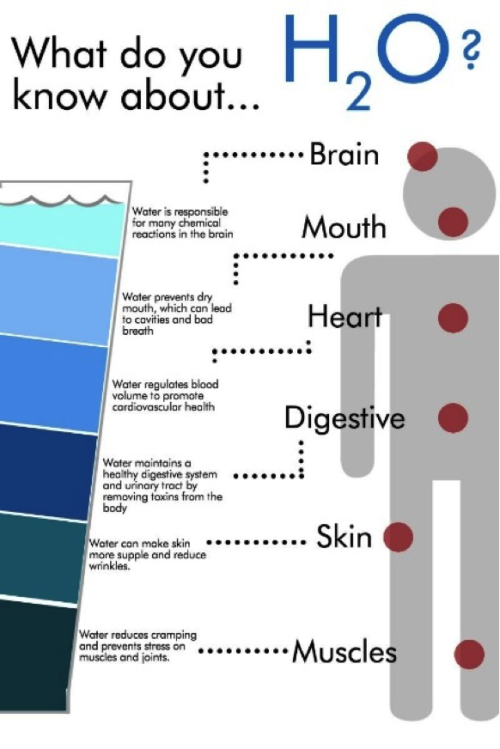
What Is Your Urine Trying to Tell You?
- Yellow? Orange? Brown? Find out what these colors mean for your health.
- 8 glasses a day isn’t the only way
- Your body knows when to H2O
Dear Reader,
“Hey, why is my pee brown?”
“Is there something wrong with me?”
“Wait, does this mean I’m not drinking enough water?”
“How much water am I supposed to drink?”
A few years ago when I was working in a hospital, this was a chain of questions I heard many times a shift. There were two reasons for this:
- 75 percent of Americans are chronically dehydrated.1
- All patients gave a urine sample at the time of admission. This means they were paying very close attention to what was going on with their urine.
While I always referred them to the charge nurse for the answer because she was in charge of their medical treatment plan, I really didn’t know what to tell them — I just drink when I am thirsty.
What I did know — many of the patients on my unit were severely dehydrated. And that certain colors meant certain medical tests were run rather quickly.
I will share what the various shades of urine could say about your health and the dangers of dehydration.
First, let’s talk about the ROYGBIV scale of urine and what it may indicate for your body.
![]() Fifty Shades of Yellow
Fifty Shades of Yellow
As you already probably know from firsthand experience, your urine isn’t always the same color.
The shade variations are caused by urochrome, a pigment that becomes lighter or darker depending on its concentration in urine.
Urochrome is the product of the liver, processing dead blood cells, and from the breakdown of bilirubin.
Often when you use the restroom for the first time after sleep, your urine can be darker than it typically is during the rest of the day due to the concentration of urochrome.
You know, that darker yellow that doesn’t show up again until the end of the day when you realize you haven’t had a glass of water since lunchtime.
As the infographic below indicates, you should probably get a glass of water soon, but you aren’t quite in the dehydration range of the scale.
But then there is that post-workout urination. This is the almost-clear and somewhat forceful pee you have after you have chugged down a liter during your run or aerobics class.
Both of these are pretty typical and healthy urination experiences — the different shades caused by your level of hydration.
Yet sometimes the color of your urine can hint that maybe things are less than perfect not only when it comes to your hydration level but other bodily functions.

The ROYGBIV scale of urine. Photo credit: tellyouall.com
On the hospital unit where I worked, many patients gave urine samples that were of the honey/amber shade. When this would happen, staff would tell the patient that they were dehydrated and that they should drink water. If it was cloudy or had a strong odor, the nurse would request a urinary tract infection screening as well.
But sometimes the patients’ urine samples were orange or even brown and sort of thick like a syrup.
When this happened, the doctor would immediately order a liver (hepatic) function panel blood test.
Why, you may ask?
Since urochrome is a product of liver functions, it can also be an indicator of liver disease. Many times, but not always, the panel results would show there was a liver issue.
If you are experiencing frequent dark or unusual urine, you should consult your physician.
Yet brown urine doesn’t always indicate a liver problem. Other reasons for dark urine include certain medications, certain foods, urinary tract infection, and kidney problems. But it could also simply be dehydration.
Dehydration can be a serious health condition on its own.
![]() Know Your H2o
Know Your H2o
Without the proper amount of water, you can experience fatigue, foggy memory, irritability, slowed metabolism, and increased risk of kidney stones. Water is also vital to keep regular bodily functions in check, like blood volume, brain function, toxin removal, and muscle support.
The most troubling part is knowing how much to drink.
There are many methods, like the “eight glasses eight times a day” rule or an ounce per pound of body weight. Either of these will likely work just fine, but the truth is your body knows what it needs.
The amount you drink really depends on your habits.
Robert A. Huggins, Ph.D., of the University of Connecticut explains:
Fluid needs are dynamic and need to be individualized from person to person. Factors such as sex, environmental conditions, level of heat acclimatization, exercise or work intensity, age, and even diet need to be considered.3

Figure 1: Water is a key part of a healthy body Photo credit: Iowastatedaily.com
Simply put, you should listen to your body. If you are thirsty, you need to grab a glass of water.
Also, be sure to take a look before you flush. If your pee is darker than a glass of lemonade, it’s time to take for a water break.
If you have any hydration hacks you would like to share, please do! nmoore@lfb.org
Live well,

Natalie Moore
Managing editor, Living Well Daily
Sources
[1] 75% of Americans May Suffer From Chronic Dehydration, According to Doctors
[2] The Science of Why Your Pee is a Yellow Color
[3] The Amount of Water You Actually Need Per Day
[4] 15 Outrageous Facts About The Bottled Water Industry
Written By Natalie Moore
Natalie Moore is a dedicated health researcher with a passion for finding healthy, natural, and science-based solutions. After a decade of direct healthcare experience in western and natural medicine, she was involved in public health research before joining Living Well Daily.
View More Free Articles
Doctor-Approved Method to Ditch Blood Pressure Meds
In a world where drug solutions dominate healthcare, it’s refreshing to discover that best remedies sometimes don’t involve a single pill. A groundbreaking study shows simple relaxation techniques could be your secret weapon against one of America’s deadliest health conditions. Best of all? It’s free, easy to start right away—and your results are bound to...
Trouble Hearing? Your Heart Could Be at Risk
With research exploding and data pouring in, scientists are uncovering some weird (and surprisingly helpful) health connections. Today’s odd couple? Hearing loss and heart failure. Turns out your ears and your ticker are more connected than you ever imagined. A major study published in the journal Heart looked at over 164,000 people for nearly a...
Stay Up Late? It Could Destroy Your Mental Health
If you dread mornings but come alive at night, there’s concerning new research you need to know about. A recent study found that “night owls” are at higher risk for depression. But before you rush to set your alarm to get up with the sun tomorrow, there’s more to the story… Chronotypes are essentially your...
Go from Flabby to Fit with this Common Vitamin
If you’re like many of us, you woke up one day, looked in the mirror, and realized you’re no spring chicken anymore. Even worse—when you weren’t paying attention—it seems you somehow misplaced the muscles of your youth and have gone from fit to flabby. Aging has a way of humbling us like that. But scientists...
Seasonal Allergy “Off Switch” Discovered in the GUT
“Doc, why am I suddenly suffering from seasonal allergies when I’ve never had them before?” It’s a question I get all the time—and my answer might surprise you. Stop looking up at the trees—and start looking down at your gut… Your sneezing fits, itchy eyes, and runny nose might have more to do with what’s...
“Canary in the Coal Mine” Test Sniffs Out Brain Issues Early
One of the most common questions I get is how to tell if you’re starting to experience cognitive decline. I get it—losing your memory is scary, especially when it sneaks up on you. But here’s some exciting news that might put your mind at ease. A fascinating new study suggests that your nose might be...
BEAT Stubborn Leg Swelling Without Dangerous Diuretics
“I need help with edema.” —Swollen Hi Swollen, When patients complain of edema—fluid retention that causes feet, ankles, and legs to swell—I explain that, while conventional medicine immediately prescribes diuretic drugs, nature offers us effective solutions we can try first. I’ll share those in just a moment, but first, let’s take a quick look at...
Mental Health Linked to 30% FASTER Aging [6-Step FIX]
Your mind and body are more connected than you might realize—and a groundbreaking new study proves just how profound that connection really is. In fact, it’s this mind-body link that helps explain why battling depression can put you on the fast track to physical decline. Depression is the most common mental health condition worldwide. We’ve...
The Air You Breathe Is Silently Stealing Your Memory
You already know that air pollution damages your lungs. Chances are you’ve heard it can also harm your heart. And I bet you won’t be surprised when I tell you it claims millions of lives annually. But now, alarming new research suggests polluted air might also damage your brain. This study found that long-term exposure...
Get Intermittent Fasting Benefits Without Going Hungry
Intermittent fasting, which involves cycling between eating and fasting periods, is effective. There’s plenty of evidence for that. It’s not just weight loss, either. Intermittent fasting has significant benefits for metabolic health. However, many people find fasting difficult to stick to—and others can’t do it at all due to medical issues—so they miss out on...









